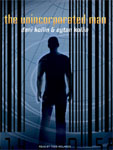
He Walked Around The Horses is a kind of story I really like. It’s based on an historical mystery. It follows the logic of the events, if accurate, to their natural, but very exceptional, conclusion. Pleasant Journey is the story of a carnival ride manufacturer’s latest product, which is a kind of virtual reality machine! It’s notable, if only for it’s 1963 vintage.
 Short Science Fiction Collection 026
Short Science Fiction Collection 026
By various; Read by various
10 Zipped MP3 Files or Podcast – Approx. 5 Hours 49 Minutes [UNABRIDGED]
Publisher: LibriVox.org
Published: September 13, 2009
Science Fiction is speculative literature that generally explores the consequences of ideas which are roughly consistent with nature and scientific method, but are not facts of the author’s contemporary world. The stories often represent philosophical thought experiments presented in entertaining ways. Protagonists typically “think” rather than “shoot” their way out of problems, but the definition is flexible because there are no limits on an author’s imagination. The reader-selected stories presented here were written prior to 1962 and became US public domain texts when their copyrights expired.
Podcast feed:
http://librivox.org/bookfeeds/short-science-fiction-collection-026.xml
iTunes 1-Click |SUBSCRIBE|
 The Adventurer
The Adventurer
By C.M. Kornbluth; Read by Gregg Margarite
1 |MP3| – Approx. 31 Minutes [UNABRIDGED]
Publisher: LibriVox.org
Published: September 13, 2009
For every evil under the sun, there’s an answer. It may be a simple, direct answer; it may be one that takes years, and seems unrelated to the problem. But there’s an answer—of a kind… From Space Science Fiction May 1953.
 Death of a Spaceman
Death of a Spaceman
By Walter M. Miller, Jr; Read by Gregg Margarite
1 |MP3| – Approx. 38 Minutes [UNABRIDGED]
Publisher: LibriVox.org
Published: September 13, 2009
The manner in which a man has lived is often the key to the way he will die. Take old man Donegal, for example. Most of his adult life was spent in digging a hole through space to learn what was on the other side. Would he go out the same way? From Amazing Stories March 1954.
 Earthmen Bearing Gifts
Earthmen Bearing Gifts
By Fredric Brown; Read by Jody Bly
1 |MP3| – Approx. 6 Minutes [UNABRIDGED]
Publisher: LibriVox.org
Published: September 13, 2009
“Mars had gifts to offer and Earth had much in return—if delivery could be arranged!” First published in the June 1960 issue of Galaxy magazine.
 The End Of Time
The End Of Time
By Wallace West; Read by Megan Argo
1 |MP3| – Approx. 55 Minutes [UNABRIDGED]
Publisher: LibriVox.org
Published: September 13, 2009
By millions of millions the creatures of earth slow and drop when their time-sense is mysteriously paralyzed. From Astounding Stories March 1933.
 He Walked Around The Horses
He Walked Around The Horses
By H. Beam Piper; Read by tabithat
1 |MP3| – Approx. 44 Minutes [UNABRIDGED]
Publisher: LibriVox.org
Published: September 13, 2009
This tale is based on an authenticated, documented fact. A man vanished—right out of this world. In November 1809, an Englishman named Benjamin Bathurst vanished, inexplicably and utterly.He was en route to Hamburg from Vienna, where he had been serving as his government’s envoy to the court of what Napoleon had left of the Austrian Empire. At an inn in Perleburg, in Prussia, while examining a change of horses for his coach, he casually stepped out of sight of his secretary and his valet. He was not seen to leave the inn yard. He was not seen again, ever. At least, not in this continuum… From Astounding Science Fiction, April 1948.
 History Repeats
History Repeats
By George O. Smith; Read by Ric F
1 |MP3| – Approx. 26 Minutes [UNABRIDGED]
Publisher: LibriVox.org
Published: September 13, 2009
There are—and very probably will always be—some Terrestrials who can’t, and for that matter don’t want, to call their souls their own… From Astounding Science Fiction May 1959.
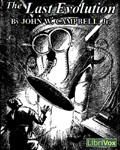 The Last Evolution
The Last Evolution
By John W. Campbell Jr.; Read by Timo B.
1 |MP3| – Approx. 59 Minutes [UNABRIDGED]
Publisher: LibriVox.org
Published: September 13, 2009
First published in AMAZING STORIES, August, 1932. Reprinted in Amazing Stories March 1961.
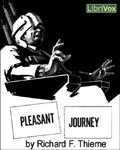 Pleasant Journey
Pleasant Journey
By Richard F. Thieme; Read by Bellona Times
1 |MP3| – Approx. 14 Minutes [UNABRIDGED]
Publisher: LibriVox.org
Published: September 13, 2009
It’s nice to go on a pleasant journey. There is, however, a very difficult question concerning the other half of the ticket… From Analog Science Fact & Fiction November 1963.
 The Second Satellite
The Second Satellite
By Edmond Hamilton; Read by Gregg Margarite
1 |MP3| – Approx. 59 Minutes [UNABRIDGED]
Publisher: LibriVox.org
Published: September 13, 2009
Earth-men war on frog-vampires for the emancipation of the human cows of Earth’s second satellite. (A Novelet.) From Astounding Stories of Super-Science, August 1930.
 Solander’s Radio Tomb
Solander’s Radio Tomb
By Ellis Parker Butler; Read by Stephen Phillips
1 |MP3| – Approx. 18 Minutes [UNABRIDGED]
Publisher: LibriVox.org
Published: September 13, 2009
“I first met Mr. Remington Solander shortly after I installed my first radio set. I was going in to New York on the 8:15 A.M. train and was sitting with my friend Murchison and, as a matter of course, we were talking radio.” First published in Amazing Stories June 1927, later in Amazing’s April 1956 issue.
Posted by Jesse Willis

 The SFFaudio Podcast #127 – Jesse, Scott, Tamahome, and Prof. Eric S. Rabkin discuss Vernor Vinge’s Rainbows End (no apostrophe).
The SFFaudio Podcast #127 – Jesse, Scott, Tamahome, and Prof. Eric S. Rabkin discuss Vernor Vinge’s Rainbows End (no apostrophe).

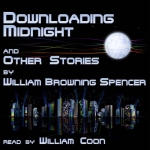


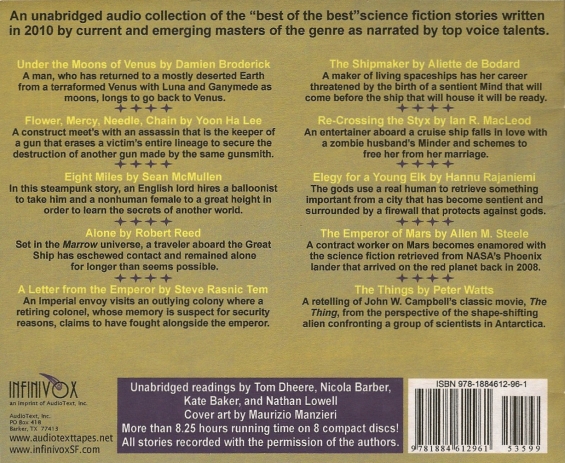

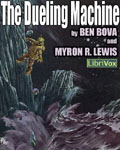


 Death of a Spaceman
Death of a Spaceman








